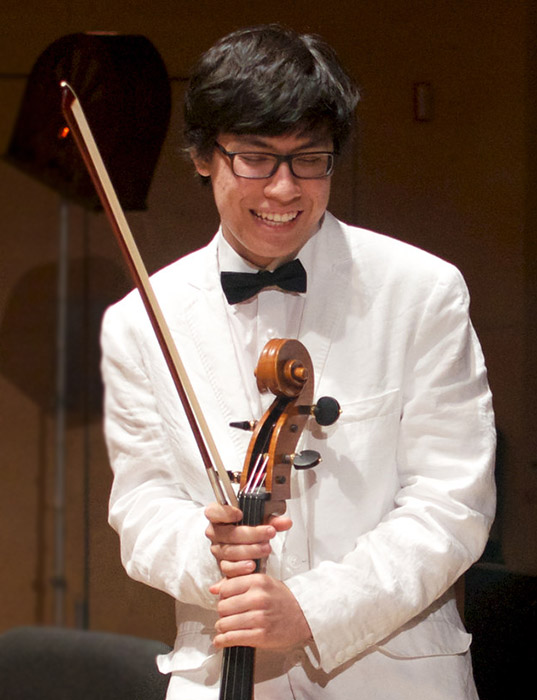
The young Tchaikovsky Competition Gold Medal cellist Zlatomir Fung spread out an imaginary opera stage populated with vividly costumed divas of the 19th century from within the warm body of his voluptuous new instrument. From this cellocopia cascaded an astonishing multitude of sonic fruits: chromatic glissandi in double stops, thumb-over techniques, arpeggiati, sul pointicelli, pizzicati, far-reaching harmonics as brilliant as the Queen of the Night, diminuendi worthy of Tebaldi, long legato tenor lines which summoned up Nicolai Gedda, saucy spicatti conjuring up the corps de ballet, and basso-buffo chortlings that would shake Rossini’s ample belly like jelly.
Why did Fung program four technically lavish, encore-style opera transcription-fantasies over his hour-long visit to Rockport’s Shalin Liu by the sea? Because he could actually play them with transcendent ease, we assume. Why had we heard none of these obscure cellist-virtuoso-composers’ show-off suites before? Probably because such divine silliness belongs to a genre no other young competition winner dares enter; elder statesmen prefer to carry Bach solo suites to dessert islands or lob throbbing romanticism across the footlights.
 It’s a given that cellists, who wrap themselves around their instruments, wring romance therefrom. Have you ever heard an expressionless modern violoncellist? Aside from the Baroque-continuo sawyer variety, these four-stringed balladeers glance heavenward for inspiration and invariably find it.
It’s a given that cellists, who wrap themselves around their instruments, wring romance therefrom. Have you ever heard an expressionless modern violoncellist? Aside from the Baroque-continuo sawyer variety, these four-stringed balladeers glance heavenward for inspiration and invariably find it.
His tones resonating handsomely in the space and sparing no effort to please, Fung seemingly handed us each an expensive bouquet worthy of the best guest at a scrumptious dinner party, yet those grand-operatic blossoms rather quickly wilted under the heat, leaving us with impressions of the eloquent young man and his astonishing technical and expressive gifts rather than any lingering messages from Verdi, Rossini, Tchaikovsky and Bellini via Alfredo Piatti, Georges Hainl, Mikhail Bukinik, and Francois Servais.
Pianist Dina Vainshtein, invariably supportive, yet never shy, emerged from the accompanist’s pit most dramatically in the opener. Alfredo Piatti’s Remembrance of Verdi’s Opera Il Trovatore came out in 1865, a dozen years after the namesake opera’s premiere. Its four-part, sparkling and shape-shifting account of the stage experience allowed the piano to function in some ways more interestingly than Verdi’s big-guitar pit bands. And it allowed for more equality between the players than in the evening’’s subsequent floral arrangements. Familiar arias sang out with post-bel canto brilliance. One wondered though, how Liszt would have transcribed Trovatore if he had been commissioned by a cellist. His solo piano Miserere de Trovatore most certainly gives us the affect of witchcraft, blood and guts, not to mention the anvil, from that old creaking chestnut of Italian verismo. Fung’s self-described “tightrope walking” rather summoned acrobats.
George Hainl wrote his Fantasy on Themes from Rossini’s William Tell while the show was still a hot property. And such a hot, and risky account came from Fung that he must have been glad for Vainshtein’s artfully reinforced safety net. This much more conventional precis of a stage piece more or less told Tell’s tale. And chivalrous acts of cello daring-do did often emerge from the enveloping vanities of fluff and patterns.
Even though Fung played it with transporting conviction, Michael Bukinik’s setting of Lensky’s Aria from Tchaikovsky’s Eugene Onegin made for a strange bedfellow under the sheets with a menage of three Italian operas. “Did you understand it, and why did you program it?” asked a commenter in the talkback. Fung averred that he needed something non-Italian for variety, and it was either that or Walter’s prize song from Meistersinger.
Vainshtein’s somewhat extended introduction to Francois Servais’s survey of Bellini’s La Fill du Régiment burst with romantic pheromones and excited our primed receptors, serving to point the flickering follow spot on a cellist clearly in a love embrace both with his instrument and his votaries. The grateful crowd crowned his closing high-wire act with the sort of ovation that usually summons up an encore. But by the end of the short night, four bravura works had charmed us with encores enough already.
In explaining the genesis of his concept, the 21-year old remarked that, “People don’t understand opera anymore. I am trying to help.” Hmmm.
Annotator Keith Horner’s essays on the obscure composers makes for enlightening reading HERE.
Lee Eiseman is the publisher of the Intelligencer


